Denationalization: Statement by Minister After Easter
Page 30
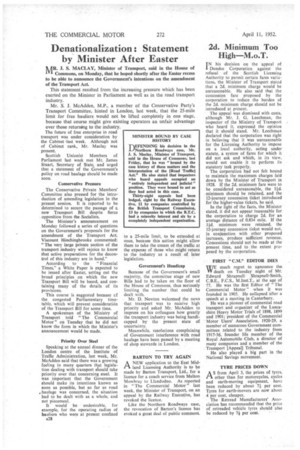
Page 31
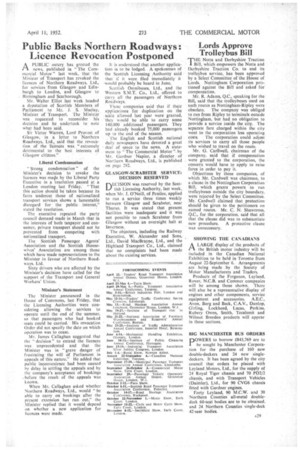
Page 32
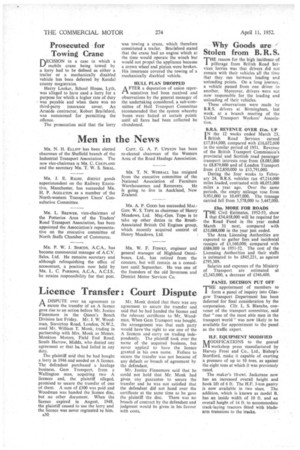
Page 33
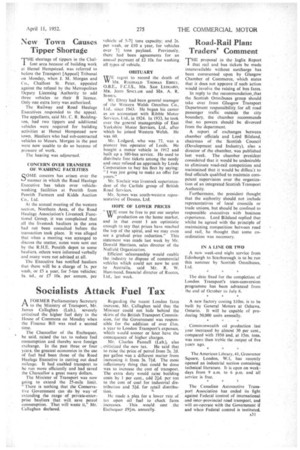
Page 34
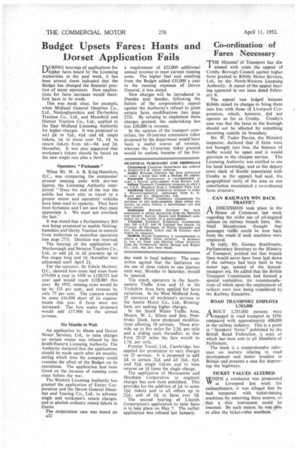
Page 35
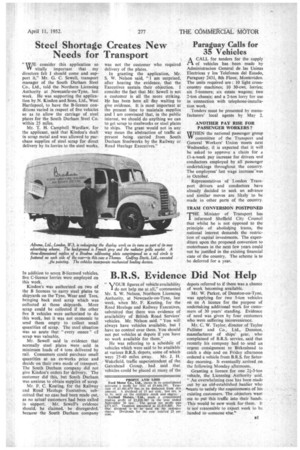
Page 36
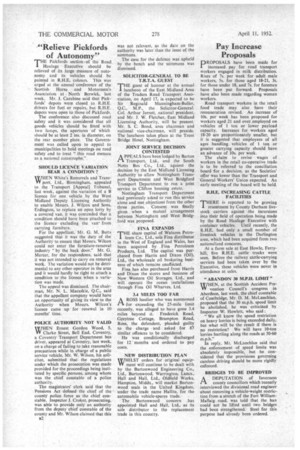
Page 37
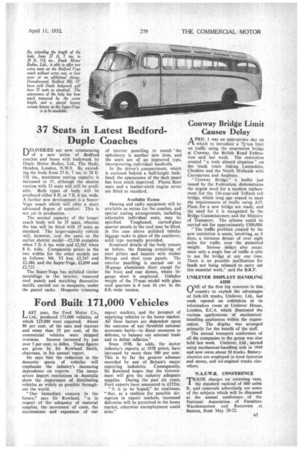
If you've noticed an error in this article please click here to report it so we can fix it.
MR. J. S. MACLAY, Minister of Transport, said in the House of "1 Commons, on Monday, that he hoped shortly after the Easter recess to be able to announce the Government's intentions on the amendment of the Transport Act.
This statement resulted from the increasing pressure which has been exerted on the Minister in Parliament as well as in the road transport industry.
Mr. S. J. McAdden, M.P., a member of the Conservative Party's Transport Committee, hinted in London, last week, that the 25-mile limit for free hauliers would not be lifted completely in one stage, because that course might give existing operators an unfair advantage over those returning to the industry.
The future of free enterprise in road transport was under consideration by the Cabinet .last week. Although not of Cabinet rank, Mr. Maclay was present.
Scottish Unionist Members of Parliament last week met Mr. James Stuart, Secretary of State, and urged that a statement of the Government's policy on road haulage should be made soon.
Conservative Pressure
The Conservative Private Members' Committee also pressed for the introduction of amending legislation in the present session. It is reported to be determined to secure the passage of a.
• new Transport Bill despite fierce . opposition from the Socialists.
The Minister's announcement on Monday followed a series of questions on the Government's proposals for the amendment of the Transport Act. Viscount Hinchingbrooke commented: "The very large private section of the transport industry will rejoice to know that active preparations for the decontrol of this industry are in hand."
According to the "Financial Times," a White Paper is expected to be issued after Easter, setting out the broad principles on which the new Transport Bill will be based, and containing many of the details of its provisions.
This course is suggested because cf the congested Parliamentary timetable, which will prevent consideration of the Transport Bill for some time.
A spokesman of the Ministry of Transport told "The Commercial Motor" on Tuesday that he did not know the form in which the Minister's announcement would be made.
Priority Over Steel Speaking at the annual dinner of the London centre of the Institute of Traffic Administration, last week, Mr. McAdden said that there was a growing feeling in many quarters that legislation dealing with transport should take priority over that concerning steel. It was important that the Government should make its intentions known as soon as possible, but so far as road haulage was concerned, the situation had to be dealt with as a whole, and not piecemeal.
It " would be undesirable, for example, for the operating radius of hauliers who were at present confined A28
to a 25-mile limit, to be extended at once, because this action might allow them to take the cream of the traffic at the expense of those who might return to the industry as a result of later legislation.
Government's Handicap
Because of the Government's small majority, the committee stage of new Bills had to be taken on the floor of the House of Commons, thus seriously limiting the number that could be dealt with.
Mr. D. Newton welcomed the news that transport was to reCeive high priority and asked Mr. MeAdden to impress on his colleagues how greatly the transport industry was being handicapped by the present state of uncertainty.
Meanwhile, resolutions complaining of Government interference with road haulage have been passed by a meeting of shop stewards in London.
BARTON TO TRY AGAIN
ANEW application to the East Midland Licensing Authority is to be made by Barton Transport, Ltd., for a licence for a coach service from Melton Mowbray to Llandudno. As reported in "The Commercial Motor" last week, the Minister of Transport, on an appeal by the Railway Executive, has revoked the licence.
Like the Northern Roadways case, the revocation of Barton's licence has evoked a great deal of public comment.
2d. Minimum Too High—M.0.T.
iN his decision on the appeal of I Dundee Corporation against the refusal of the Scottish Licensing Authority to permit certain fares variations, the Minister of Transport stated that a 2d. minimum charge would be unreasonable. He also said that the concession fare proposed by the corporation to reduce the burden of the 2d. minimum charge should not be introduced at present.
The appeal was dismissed with costs, although Mr. J. G. Leechman, the inspector of the Ministry of Transport who heard it, expressed the opinion that it should stand. Mr. Leechman declared that the corporation was right in believing that it was unreasonable for the Licensing Authority to impose on a local authority, acting under statute, a system of fares for which it did not ask and which, in its view, would not enable it to perform its statutory task properly.
The corporation had not felt bound to maintain the maximum charges laid down by the Minister of Transport in 1928. If the 2d. minimum fare were to be considered unreasonable, the Iid. minimum should be retained, and the 12-journey concession ticket introduced for the higher-value tickets, he said.
In the light of the facts, the Minister stated, it did not appear reasonable for the corporation to charge 2d. for an average distance of 0.834 mile. If the lid. minimum were retained, the 12-journey concession ticket would not, in conjunction with other proposed increases, produce sufficient revenue. Concessions should not be made at the present time, and to the extent proposed by the corporation.
FIRST " C.M." EDITOR DIES WE much regret to announce the death on Tuesday night of Mr. Edward ShrapnellShrapnell-Smith, C.B.E., F.C.S., IVI.Inst.T., at the age of 77. He was the first Editor of "The Commercial Motor" when it was founded in 1905. He collapsed after a speech at a meeting in Canterbury.
He was a pioneer of commercial road transport and organizer of the Lancashire Heavy Motor Trials of 1898, 1899 and 1901; president of the Commercial Motor Users' Association, 1920-29, a member of numerous Government committees related to the industry from 1917-36, founder life member of the Royal Automobile Club, a director of many companies and a member of the Transport [Appeal] Tribunal. He also played a big part in the National Savings movement.
TYRE PRICES DOWN
A S from April 3, the prices of tyres, 11 other than for motorcycles, cycles and earth-moving equipment, have been reduced by about 71per cent. Tyres for earth-movers are now about 4 per cent. cheaper.
• The Retread Manufacturers' Association has recommended that the price of retreaded vehicle tyres should also be reduced by 7f per cent. •
Lords Approve • Trolleybus Bill
THE Notts and Derbyshire Traction 1 Bill, which empowers the Notts and Derbyshire Traction Co. to end its trolleybui service; has been approved by a Select Committee of the House of Lords. Nottingham Corporation petitioned 'against the Bill and asked for compensation.
Mr. R. Adams, Q.C., speaking for the Bill, said that the trolley buses used on
such route's as Not were obsolete. The company was obliged to run from Ripley to terminals outside Nottingham, -but had no obligation to previde a service inside the city. The separate fare charged within the city went to the corporation less operating
costs. The corporation could adjust its services to carry all those people who wished to travel on the route.
Mr. G. " Cartwelli chairman. of the company, said that if compensation were granted to the corporation, the concern would have to apply to raise fares in order to pay it.
Objections by three companies, of which Mr. Cardwell was chairman, to a clause in the Nottingham Corporation Bill, which grants powers to run trolleybuses outside the city boundary, were 'rejected by the Select Committee. Mr. Cardwell claimed that protection should be given to the petitioners on named routes. Mr. C. N. Shawcross, • Q.C, for The corporation, said that all that the clause did was to substantiate new procedure. A protective clause was unnecessary.
SHOWING THE CANADIANS
ALARGE display of the products of the British motor industry will be included in the Canadian National Exhibition to be held in Toronto from August 22-September 6. Arrangements are being made by the Society of Motor Manufacturers and Traders.
Products of the Ferguson, Leyland, Rover, N.C.B. and Commer companies will be among those shown. There will also be a representative display of engines and other components, service equipment and accessories. A.E.C., Avon, Borg and Beek, C.A.V., Dunlop, Girling, Lockheed, Lucas, Perkins, Rubery Owen, Smith, Tecalemit and Wilmot Breeden products will appear in these sections.
BIG MANCHESTER BUS ORDERS DOWERS to borrow 1845,769 are to I be sought by. Manchester Corporation for the purchase of 160 new double-deckers and 24 new singledeckers. It has been agreed by the city council that orders be placed with Leyland Motors, Ltd., for the supply of 24 Royal Tiger chassis and 70 PD2/2 chassis, and with Transport Vehicles (Daimler), Ltd., for 90 CVG6 chassis fitted with Gardner engines.
Forty Leyland, 90 M.C.W. and 30 Northern Counties all-metal doubledeck 60-seat bodies are to be obtained, and 24, Northern Counties single-deck 42-seat bodies.
Prosecuted for Towing Crane
DECISION in a case in which a mobile crane being towed by a lorry had to be defined as either a trailer or a mechanically disabled vehicle has been deferred by Kendal county magistrates.
Harry Looker, School House, Lyth, was alleged to have used a lorry for a purpose for whieh a higher rate of duty was payable and when there was no third-party insurance cover. An Arnside contractor, Robert Brailsford, was summoned for permitting the offence.
The prosecution said that the lorry was towing a crane, which therefore constituted a trailer. Brailsford stated that the crane had an engine which at the time would operate the winch but would not propel the appliance because a crown wheel and pinion were broken. His insurance covered the towing of a mechanically disabled vehicle.
HULL PLAN DROPPED
AFTER a deputation of union representatives had been received and observations by the general manager of the undertaking considered, a sub-committee of Hull Transport Committee recommended that the system whereby buses were halted at certain points until all fares had been collected be abandoned,
Why Goods are Stolen from B. R. S.
THE reason for the high incidence -of pilferage from British Road Services lorries was that drivers did not remain with their vehicles all the time that they ran between loading and unloading points. On a long journey. a vehicle passed from one driver to another. Moreover, drivers were not now responsible for the loading and unloading of their vehicles.
These observations were made by B.R.S. drivers at Birmingham, last week, at a branch meeting of the United Transport Workers' Association.
B.R.S. REVENUE OVER Elm. UP
IN the 12 weeks ended March 23, British Road Services earned £17,814,000, compared with £16,672,000 in the similar period of 1951. Revenue of the British Transport Commission's provincial and Scottish road passenger transport interests rose from £8,085,000 to £8,879,000 and of London Transport from £12,850,000 to £13,791,000.
During the four weeks to February 24, B.R.S. vehicles ran 47,214,000 miles loaded, contrasted with 48,053,000 miles a year ago. Over the same periods, the empty mileage rose from 9,931,000 to 10,497,000. The tonnage carried fell from 3,578,000 to 3,447,000.
Om. MORE FOR ROADS
THE Civil Estimates, 1952-53, show that £34,418,000 will be required for the Road Fund in the year ended March 31 next, compared with £31,088,000 in the year just ended.
The Area Licensing Authorities are expected to gather fees and incidental receipts of £1,160,000, compared with £684,000 in 1951-52. The cost of the Licensing Authorities and their staffs is estimated to be £845,221, as against £793,309.
Salaries and expenses of the Ministry of Transport are estimated at £2,343,000, a decrease of £346,400.
PANEL DECISION PUT OFF
appointment of members to 'THE a panel of inquiry into Glasgow Transport Department has been deferred for final consideration by the corporation. Cllr. L. S. Blanche, convener of the transport committee, said that "one of the most able men in the transport world" was now likely to be available for appointment to the panel as the traffic expert.
H.F. EQUIPMENT MODIFIED fiODIFICATIONS to the geared IVI. workshop press manufactured by Harvey Frost and Co., Ltd., Bishop's Stortford, make it capable of exerting a pressure of up to 10 tons, as against the eight tons at which it was previously rated.
The maker's 10-cwt. Jackcrane now has an increased overall height and hook lift of 6 ft. The H.F. 3-ton gantry is now available in two sizes. The addition, which is known as model B, has an inside width of 10 ft. and an overall height of 14 ft. to accommodate track-laying tractors fitted with blade arm trunnions to the tracks.
Road-Rail Plan: Traders' Comment
THE proposal in the Inglis Report 1 that rail and bus tickets be made interavailable without sureharge has been commented upon by Glasgow Chamber of Commerce, which states that it does not approve if such action would involve the raising of bus, fares.
In reply to the recommendation.that the Scottish Omnibuses group should take over from Glasgow Transport Department responsibility, for all road passenger traffic outside the city boundary, the chamber recommends that no powers should be divorced from the department.
A report, of exchanges between chamber officials and Lord Bilsland, chairman of the Scottish Council (Development' and Industry), also a director of the chamber, was published last week. The chamber president considered that it would be undesirable to eliminate road-rail competition and maintained that it would be difficu:t to find officials qualified to maintain competent supervision over the organization of an integrated Scottish Transport Authority.
Furthermore, the president thought that the authority should not include representatives of local councils or trade unions, but should be confined to responsible executives with business experience. Lord Bilsland replied that whilst he agreed with the principle of maintaining competition between road and rail, he thought that some coordination was necessary.
IN A LINE OR TWO
A new week-end night service from Edinburgh to Scarborough is to be run this summer by Scottish Omnibuses, Ltd.
The date fixed for the completion of London Transport's tram-conversion programme has been advanced from the end of October to July 6.
A new factory costing $10m. is to be built by General Motors at Oshawa, Ontario. It will be capable of producing 50,000 units annually.
Commonwealth oil production .last year increased by almost 30 per cent., compared with 1950 and, at 15m. tons, was more than treble the output of five years ago.
The American Library, 41, Grosvenor Square, London, W.I, has recently opened an industrial section containing technical literature. It is open on weekdays from 9 a.m. to 6 p.m. and all service is free.
The Canadian Automotive Transport Association has ended its fight against Federal 'control of international and inter-provincial road transport, and will co-operate with the Government if and when Federal control is instituted.
Co-ordination of Fares Necessary
THE Minister' of Transport has dismissed with costs the appeal: of Crosby Borough Council against higher fares granted to Ribble Motor Services, Ltd., by the North-Western Licensing Authority. A report of the appeal hearing appeared in our issue dated February 8.
The appeal was lodged because Ribble raised its charges to bring them into line with those of Liverpool Corporation, which, however, did not operate as far as Crosby. Crosby's case was that the fares in the borough should not be affected by something occurring outside its boundary. ,
Mr. W. Tudor Davies, the ,Ministry inspector, declared that if fares were not -brought into line, the balance of traffic would be upset and it would gravitate to the cheaper service. The Licensing Authority was entitled to use his local knowledge, and as the deputy town clerk of Bootle (associated with Crosby in the appeal) had said, the geographical unity of the area as one conurbation necessitated a co-ordinated fares structure.
CAN RAILWAYS WIN BACK TRAFFIC?
A DISCUSSION took place in the Pi House of Commons last week regarding the wider use of oil-engined railcars on railway branch lines. Mr. Niall Macpherson thought that passenger traffic could be won back from the roads if such machines were employed.
In reply, Mr. Gurney Braithwaite, Parliamentary Secretary to the Ministry of Transport, pointed out that branch lines would never have been laid down if the railways had been built in the motor age, instead of the horsedtransport era. He added that the British Transport Commission had formed a special committee, the. recommendations of which upon the employment of railcars were now being considered by the Railway Executive.
ROAD TRANSPORT EMPLOYS 1;783,009
A BOUT 1,783,000 persons were r %engaged in road transport in 1950, compared with approximately 600,000 in the railway industry. This is a point in "Speakers' Notes" published by the British Road Federation, a copy of which has been sent to all Members of Parliament.
The book is a comprehensive reference on matters relating to road development and motor taxation in Britain and presents a case for improving the highways.
TICKET VALUES ALTERED
VVHEN a conductor was prosecuted. at Liverpool last week for embezzlement, it was alleged that he had tampered with ticket-issuing • machines by removing three screws, so that a thin instrument could be • inserted. By such means, he was able to alter the ticket-value numbers.
Paraguay Calls for 35 Vehicles
ACALL for tenders for the supply of vehicles has been made by Administracion General de las Usinas Electricas y los Telefonos del Estado, Paraguay 2431, 8th Floor, Montevideo. The units required are : 10 light crosscountry machines; 10 30-cwt. lorries; six 5-tanners; six estate wagons; two 2-ton chassis; and a 2-ton lorry for use in connection with telephone-installation work.
Tenders must be presented by manufacturers' local agents by May 2.
ANOTHER PAY RISE FOR PASSENGER WORKERS? WHEN the national passenger group vv committee of the Transport and General Workers' Union meets next Wednesday, it is expected that it will he asked to approve a claim for a El-a-week pay increase for drivers and conductors employed by all passenger undertakings throughout the country. The employees' last wage increase was in October.
Representatives of London Transport drivers and conductors have already decided to seek an advance and similar moves are likely to be made in other parts of the country.
TRAM CONVERSION POSTPONED
THE Minister of Transport has informed Sheffield City Council that whilst he is not opposed to the principle of abolishing trams, the national interest demands the restriction of capital investments. The expenditure upon the proposed conversion to motorbuses in the next few years could not be justified in the existing financial state of the country. The scheme is to be deferred for a year.
'"Relieve Pickfords of Autonomy"
THE Pickfords section of the Road Haulage Executive should be relieved of its large measure of autonomy and its vehicles should be painted in R.H.E. colours. This was urged at the annual conference of the Scottish Horse and Motormen's Association at North• Berwick, last week. Mr. J. Carabine said that Pickfords' depots were closed to R.H.E. drivers for fuel or repairs, but R.H.E. depots were open to those of Pickfords.
The conference also discussed road safety and it was considered that all goods vehicles should be fitted with two lamps, the apertures of which should be at least 2 ins, in diameter, on the rear number plate. The Government was called upon to ,appeal to municipalities to hold meetings on road safety and to treat " this road menace as a national catastrophe.", SHOULD LICENCE VARIATION BEAR A CONDITION?
WHEN White's Removals and TransVV port. Ltd., Birmingham, appealed to the Transport [Appeal] Tribunal, last week, against the variation of a B licence for one vehicle by the West Midland Deputy Licensing Authority to enable Messrs. J. Wilcox and Sons, Erdington, to replace an open lorry by a covered van, it was contended that a condition should have been attached to the licence excluding the vanfrom carrying furniture.
For the appellant, Mr. G. M. Butts suggested that it was the duty of the Authority to ensure that Messrs. Wilcox could not enter the furniture-removal industry "by the back door." Mr. G. Mercer, for the respondents, said that it was not intended to carry on removal work. The variation would not be detrimental to any other operator in the area and it would hardly be right to attach a condition to the licence when a variation was made.
The appeal was dismissed. The chairman, Mr. N. L. Macaskie, Q.C., said that the appellant company would have an opportunity of giving its view to the Authority when Messrs. Wilcox's licence came up for renewal in 10 months' time.
POLICE AUTHORITY NOT VALID WHEN Ernest Gordon Wood, 5, VY Clarke Street, Bell End, Coventry, a Coventry Transport Department bus driver, appeared at Coventry, last week, on a charge of failing to take reasonable precautions while in charge of a public service vehicle, Mr. W. Wilson, his solicitor, submitted that the regulations under which the prosecution was made provided for the proceedings being instituted by specific persons, among whom was the chief constable of a police authority.
The magistrates' clerk said that the Pensions Act defined the chief of the county police force as the chief constable. Inspector J. Croker, prosecuting, was able to provide only an authority from the deputy chief constable of the county and Mr. Wilson claimed that this B2 was not relevant, as the date on the authority was later than the issue of the summons.
The case for the defence was upheld by the bench and the summons was dismissed.
SOLICITOR-GENERAL TO BE T.R.T.A. GUEST THE guest of honour at the annual luncheon of the East Midland Area of the Traders Road Transport Association, on April 17, is expected to be Sir Reginald Manningham-Buller, Q.C., M.P., the Solicitor-General. Col. Arthur Jerrett, national president, and Mr. J. W. Fletcher, East Midland Licensing Authority, will be present. Mr. S. C. Bond, area chairman and national vice-chairman, will preside. The luncheon takes place at the Trent Bridge Hotel, Nottingham.
JOINT SERVICE DECISION CONTESTED
APPEALS have been lodged by Barton Transport, Ltd., and the South Notts Bus Co., Ltd., against the decision by the East Midland Licensing Authority to allow Nottingham Transport Department and West Bridgford Transport Department to run a joint service to Clifton housing estate.
Nottingham Transport Department had previously asked to run this service alone and met objections from the other three parties. Consent was finally given when a mutual arrangement between .Nottingham and West Bridgford was proposed.
FINA EXPANDS 'THE share capital of Watsons Petro1 leum Co., Ltd., sole Fina distributor in the West of England and Wales, has been acquired by Fina Petroleum Products, Ltd. The capital was purchased from Harris and Dixon (Oil), Ltd., the wholesale oil brokering business of which remains unaffected.
Fina has also purchased from Harris and Dixon the stores and business of New Western Oil Storages. Ltd., and will operate the ocean installations through Fina Oil Wharves, Ltd.
3.4 MILES TOO FAR rlA ROSS haulier who was summoned for exceeding the 25-mile limit recently, was alleged to have gone 3.4 miles beyond it. Frederick Road, Greytree Cottage, Brampton Road, Ross, the defendant, pleaded guilty to the charge and asked for 87 similar offences to be considered.
He was conditionally discharged for 12 months and ordered to pay costs.
NEW DISTRIBUTION PLAN WHILST orders for original equip1'V merit will continue to be dealt with by the Burtonwood Engineering Co., Ltd., Burtonwood, Warrington, Lancs., Hall and Hall, Ltd., Oldfield Works, Hampton, Middx., will market Burtonwood seals in the United Kingdom, under the trade name Hallite, for the automobile vehicle-spares trade.
The Burtonwood concern has appointed Hall and Hall, Ltd.. as its sole distributor to the replacement trade in this country.
Pay Increase Proposals
ROPOSALS have been made for increased pay for road transport workers engaged in milk distribution. Rises of 7s. per week for adult male workers, 5s. for those aged 18-21, 3s. for those under 18, and 7s. for foremen have been put forward. Proposals have also been made regarding women workers.
Road transport workers in the retail food trade may also have their remuneration revised. An increase of 10s. per week has been proposed for workers aged 21 and over employed on vehicles of 1 ton or lower payload capacity. Increases for workers aged 18-20 are proportionately smaller, but it is suggested that employees of all ages handling vehicles of 1 ton or greater carrying capacity should have an advance of 10s. per week.
The claim to revise wages of workers in the retail co-operative trade is to be referred to the conciliation board -for a decision, as the Societies' offer was lower than the Transport and General Workers' Union expected. An early meeting of the board will be held.
R.H.E. INCREASING CATTLE FACILITIES
THERE is reported to be growing 1 resentment by County Durham livestock carriers against -the incursions into their field of operation being made by the Road Haulage Executive with container vehicles. Until recently, the R.H.E. had only a small number of livestock vehicles in the Darlington area, which had been acquired from two nationalized concerns.
At a farm sale at East Howle, Ferryhill, five R.H.E. cattle trucks were seen. Before the railway cattle-carrying services had been taken over by the Executive, these vehicles were never in attendance at sales.
"ABANDON 30 M.P.H. LIMIT"
VVHEN, at the Scottish Accident Prevention Council's congress in Aberdeen, last week, the chief constable of Coatbridge, Mr. D. M. McLauchlan, proposed that the 30 m.p.h. speed limit be abolished, he was criticized by Inspector W. Howlett, who said :
"We all know the speed restriction on heavy lorries is being exceeded daily, but what will be the result if there is no restriction? We will have 10-ton lorries hurtling along the roads at 50-60 m.p.h." In reply, Mr. McLauchlan said that the enforcement of speed limits was absolutely impossible, but he considered that the provisions governing careless driving should be more rigidly enforced.
BRIDGES TO BE IMPROVED
ADEPUTATION of Inverness county councillors which recently interviewed the divisional road engineer about removing a vehicle-weight restriction from a stretch of the Fort WilliamMallaig road, was told that the ban could not be lifted until two bridges had been strengthened. Steel for this purpose had already been ordered.
Conway Bridge Limit Causes Delay
A FRIL I was an appropriate day on which to introduce a 71-ton limit on traffic using the suspension 'bridge at Conway, the British Road Federation said last week. The restriction created "a truly absurd situation" on the trunk route linking Lancashire, Cheshire and the North Midlands with Caernarvon and Anglesey.
"Conway Bridge," a leaflet 'just issued by the Federation, demonstrates the urgent need for a modern replacement for the 126-year-old Telford toll bridge, which long ago ceased to meet the requirements of traffic using A55. Plans for a new bridge are ready, and the need for it is recognized by the Bridge Commissioners and the Ministry of Transport. The scheme could be carried out for approximately £500,000.
"The traffic problem created by the new restriction is acute, involving, as it does, a tortuous detour of over eight miles for traffic over the permitted weight. Serious delays also occur, since only a single line of traffic is able to use the bridge at any one time. There is no possible justification for funds not being released to carry out this essential work," said the B.R.F.
UNILEVER DISPLAYS HANDLING AIDS
I-NNE of the first big concerns in this ,
country' to exploit the advantages of fork-lift trucks, Unilever, Ltd., last week opened. an exhibition in its information room at Unilever House,. London, E.C.4, which illustrated the various applications of mechanicalhandling appliances within the organization. The display was arranged primarily for the benefit of the staff.
The annual transport conference of all the companies in the group was also held last week. Unilever, Ltd., started using .mechanical-handling aids in 1949 and now owns .about 50 trucks. Batteryelectrics are employed in food factories and stores; and oil-engined trucks elsewhere.
NA.F.W.R. CONFERENCE 'TRADE charges Oil returning vans, 1 the standard vanload of 600 cubic ft. and removals adv-ertisirt are some of the subjects which will be: discussed at the annual conference r of • the National Association.. of Furniture. Warehousemen and Removers at Buxton, from May 20-22.




















































































